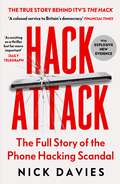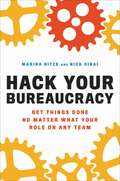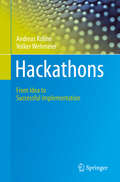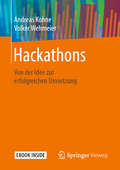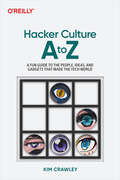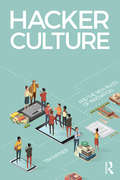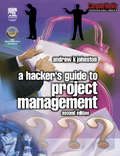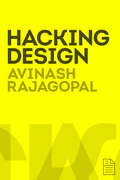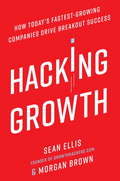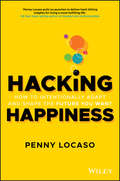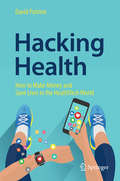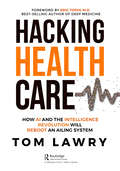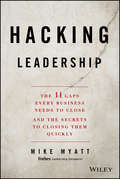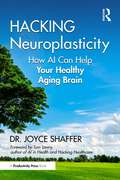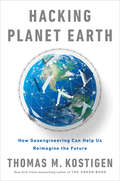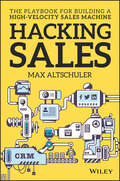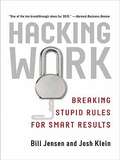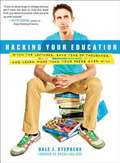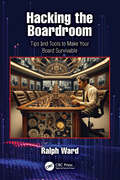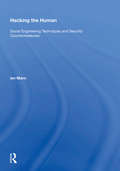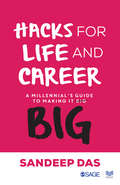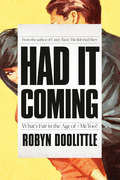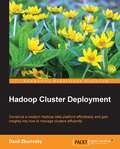- Table View
- List View
Hack Attack: The full story of the phone hacking scandal
by Nick Davies**A SUNDAY TIMES BESTSELLER, THE TRUE STORY BEHIND ITV’S MAJOR NEW DRAMA, THE HACK**WITH EXPLOSIVE NEW EVIDENCE, THIS IS THE UPDATED EDITION OF THE BOOK THAT EXPOSED THE PHONE HACKING SCANDAL Crime, conspiracy, abuse of power – this is the inside story of the scandal that blew the lid off Rupert Murdoch’s empire. Nearly twenty years since one of Murdoch’s reporters was caught eavesdropping on Buckingham Palace, the revelations keep coming. And Nick Davies is still digging out new evidence.Hack Attack is the story of how Davies and a network of rebel lawyers, MPs and celebrities took on one of the most powerful men in the world and uncovered a web of crime and cover-up reaching from the Murdoch newsrooms to Scotland Yard and Downing Street. It was a scandal that shocked the British elite. And it’s not over yet.CONTAINS A NEW CHAPTER WITH ALL-NEW EVIDENCE'A colossal service to Britain's democracy' Financial Times'As exciting as a thriller but far more important' Daily Telegraph'A masterly summary of the hacking affair, as well as the ingenuity and persistence that lead to great journalism' Observer
Hack Your Bureaucracy: Get Things Done No Matter What Your Role on Any Team
by Nick Sinai Marina NitzeIn this "deeply empowering and practical book"(Cecilia Muñoz), two technology and innovation leaders reveal dozens of tactics that enabled them to accomplish seemingly impossible reforms in organizations of all types and sizes. Whether you just started your first entry-level job, run the entire company, or just feel trapped by your condo association bylaws, it&’s time to it&’s time to learn how to get big things done and make a lasting impact with Hack Your Bureaucracy. From local government to the White House, Harvard to the world of venture capital, Marina Nitze and Nick Sinai have taken on some of the world&’s most challenging bureaucracies—and won. Now, they bring their years of experience to you, teaching you strategies anyone can use to improve your organization through their own stories and those of fellow bureaucracy hackers, including: Find Your Paperclip: use small steps to achieve big change Set Your North Star: keep your end goal in sight Cultivate the Karass: assemble an adept team and network Don&’t Waste a Crisis: turn every opportunity into a chance for change And more! Change doesn&’t happen just because the person in charge declares it should, even if that person is the CEO of your company or the President of the United States. Regardless of your industry, role, or team, Hack Your Bureaucracy shows how to get started, take initiative on your own, and transform your ideas into impact.
Hackathons: From Idea to Successful Implementation
by Andreas Kohne Volker WehmeierThis book provides a detailed and comprehensive overview of all phases of a hackathon and thus helps to reduce complexity, to use opportunities, to avert pitfalls and to avoid problems. In addition, it also explains from a participant’s perspective how to succeed in a hackathon. Lastly, the book is rounded off by extensive checklists, which support you in your own hackathons. The book is structured as follows: At first the basics and the history of hackathons are described in chapter 1. Afterwards the three phases of a hackathon are described in detail. This is started in chapter 2 with the description of the individual measures which are to be accomplished before the actual event. Here not only technical or organizational aspects are described, but also the important legal aspects are discussed. Subsequently, it is shown what is necessary to carry out a hackathon successfully. For this purpose the actual execution with all its steps is described in chapter 3. Next, chapter 4 looks at the follow-ups, which are often neglected or even completely forgotten. Chapter 5 describes from a participant’s point of view the reasons for participating in a hackathon and which aspects guarantee a successful participation. In the following chapter 6 the criticism of the format of the hackathons and their execution is also examined in detail. Eventually, the most important points are summarized in chapter 7, before chapter 8 gives a view into the future of hackathons. Subsequently chapter 9 collects statements and opinions of representatives from industry, science and administration on the topic of hackathons. The book is rounded off in chapter 10 with detailed checklists, which can be directly used for the successful planning, operation and follow-up of hackathons. The book is written for everyone with an interest in how hackathons work, how to create them, and how to successfully participate. It especially targets people in industry or young students who want to run or participate in a hackathon.
Hackathons: Von der Idee zur erfolgreichen Umsetzung
by Andreas Kohne Volker WehmeierErfahren Sie in diesem Buch mehr über das Phänomen HackathonsEs gibt Events, die ermöglichen es ihren Akteuren, interdisziplinär in einen kreativen Dialog zu treten. Dieses Buch widmet sich den sogenannten Hackathons – einem Veranstaltungsformat, das sich seit Jahren großer Beliebtheit erfreut. Die Erfolgsgeschichte begann wie so oft in Amerika, mittlerweile wird das disruptive Brainstorming jedoch weltweit erfolgreich durchgeführt, umin kürzester Zeit Technologien, Geschäftsmodelle und Produkte zu entwickeln.neues Personal zu rekrutieren.interdisziplinäre Teams effizient zusammenzubringen.Das Ergebnis kann u. a. eine kollaborative Software- und Hardwareentwicklung sein. Dieses Buch von Andreas Kohne und Volker Wehmeier widmet sich nicht nur der Frage, was ein Hackathon ist, sondern erklärt Ihnen zudem, wie Sie einen Hackathon organisieren und worauf Sie bei der Durchführung eines solchen Events achten sollten.Programmieren, Recruiting und InnovationenDie Entwicklung neuer Ideen, Konzepte und Lösungen sowie das Testen verschiedener Projekte stehen stets im Fokus der Teilnehmer unterschiedlicher Branchen. Gleichzeitig bieten sie Start-ups die perfekte Gelegenheit, um ihr Geschäftsmodell von Experten bewerten zu lassen. Sie können sich vorstellen, wie wichtig daher die Planung eines solchen Events für alle Beteiligten ist. In diesem Buch über Hackathons erhalten Sie einen ebenso praxisnahen wie kompakten Überblick über folgende Bereiche:PlanungDurchführungNachbereitungMehrwertUm Ihnen den Einstieg in die Thematik zu erleichtern, finden Sie am Ende des Werkes neben prägnanten Checklisten auch Ablaufübersichten. Das Buch fokussiert sich nicht nur auf die Veranstalter eines Hackathons. Es berücksichtigt ebenfalls die Teilnehmersicht sowie die Stimmen aus der Wirtschaft und Verwaltung. Dadurch erhalten Sie umfassenden Input von beiden Seiten.
Hacked: The Secrets Behind Cyber Attacks
by Dr Jessica BarkerWhen it comes to cyber attacks, everyone's a potential victim. But you don't have to be helpless against these threats. Hacked offers the knowledge and strategies you need to protect yourself and your business. In this book, cybersecurity expert Jessica Barker uncovers how hackers are weaponizing cutting-edge tactics and technologies to target individuals and organizations, before showing how you can safeguard yourself against any potential attacks and how to react if you do become a target.Featuring expert commentary from world-leading cybersecurity experts and ethical hackers, this book uncovers the fascinating stories of the most insidious and notorious cyber attacks, including how the Mirai malware almost took down the internet and how a supply chain attack infiltrated the US government and other global institutions.From social engineering and data theft to ransomware and Distributed Denial-of-Service (DDoS) attacks, there are numerous strategies that hackers use to target our finances and data. Uncover their secrets and learn how to safeguard your data with Hacked.
Hacker Culture A to Z: A Fun Guide to the People, Ideas, and Gadgets That Made the Tech World
by Kim CrawleyHacker culture can be esoteric, but this entertaining reference is here to help. Written by longtime cybersecurity researcher and writer Kim Crawley, this fun reference introduces you to key people and companies, fundamental ideas, and milestone films, games, and magazines in the annals of hacking. From airgapping to phreaking to zombie malware, grasping the terminology is crucial to understanding hacker culture and history.If you're just getting started on your hacker journey, you'll find plenty here to guide your learning and help you understand the references and cultural allusions you come across. More experienced hackers will find historical depth, wry humor, and surprising facts about familiar cultural touchstones.Understand the relationship between hacker culture and cybersecurityGet to know the ideas behind the hacker ethos, like "knowledge should be free" Explore topics and publications central to hacker culture, including 2600 MagazineAppreciate the history of cybersecurityLearn about key figures in the history of hacker cultureUnderstand the difference between hackers and cybercriminals
Hacker Culture and the New Rules of Innovation
by Tim RaynerFifteen years ago, a company was considered innovative if the CEO and board mandated a steady flow of new product ideas through the company’s innovation pipeline. Innovation was a carefully planned process, driven from above and tied to key strategic goals. Nowadays, innovation means entrepreneurship, self-organizing teams, fast ideas and cheap, customer experiments. Innovation is driven by hacking, and the world’s most innovative companies proudly display their hacker credentials. Hacker culture grew up on the margins of the computer industry. It entered the business world in the twenty-first century through agile software development, design thinking and lean startup method, the pillars of the contemporary startup industry. Startup incubators today are filled with hacker entrepreneurs, running fast, cheap experiments to push against the limits of the unknown. As corporations, not-for-profits and government departments pick up on these practices, seeking to replicate the creative energy of the startup industry, hacker culture is changing how we think about leadership, work and innovation. This book is for business leaders, entrepreneurs and academics interested in how digital culture is reformatting our economies and societies. Shifting between a big picture view on how hacker culture is changing the digital economy and a detailed discussion of how to create and lead in-house teams of hacker entrepreneurs, it offers an essential introduction to the new rules of innovation and a practical guide to building the organizations of the future.
Hacker's Guide to Project Management
by Andrew JohnstonManaging a software development project is a complex process. There are lots of deliverables to produce, standards and procedures to observe, plans and budgets to meet, and different people to manage. Project management doesn't just start and end with designing and building the system. Once you've specified, designed and built (or bought) the system it still needs to be properly tested, documented and settled into the live environment. This can seem like a maze to the inexperienced project manager, or even to the experienced project manager unused to a particular environment.A Hacker's Guide to Project Management acts as a guide through this maze. It's aimed specifically at those managing a project or leading a team for the first time, but it will also help more experienced managers who are either new to software development, or dealing with a new part of the software life-cycle. This book:describes the process of software development, how projects can fail and how to avoid those failuresoutlines the key skills of a good project manager, and provides practical advice on how to gain and deploy those skillstakes the reader step-by-step through the main stages of the project, explaining what must be done, and what must be avoided at each stagesuggests what to do if things start to go wrong!The book will also be useful to designers and architects, describing important design techniques, and discussing the important discipline of Software Architecture.This new edition:has been fully revised and updated to reflect current best practices in software developmentincludes a range of different life-cycle models and new design techniquesnow uses the Unified Modelling Language throughout
Hacking Design
by Avinash RajagopalWhat if you could press a button and have a machine build you any product you wanted? What if we all had the means to modify our physical environment, to tweak and subvert objects produced for us by designers and manufacturers? A new generation of hardware hackers is making steady progress toward making these hypotheses reality, building vibrant communities in the process. And designers are experimenting with open-source creation and customization, trying to come to terms with the hackers' visions of the future. Hacking Design examines the conflicts and commonalities between hackers and professional designers, and uncovers shared ground on which the two creative communities can work together.DesignFile is the new line of e-books on topics and trends in design published by the Cooper-Hewitt, Smithsonian Design Museum. There will be six to twelve titles published annually, each ranging in length from 7,500 to 20,000 words. Building a consortium with institutional partners and design practitioners, Cooper-Hewitt's series will bridge the academic, museum, design, and publishing worlds. Inaugural members of the e-book consortium are Parsons The New School for Design and the School of Visual Arts.
Hacking Growth: How Today's Fastest-Growing Companies Drive Breakout Success
by Morgan Brown Sean EllisThe definitive playbook by the pioneers of Growth Hacking, one of the hottest business methodologies in Silicon Valley and beyond.It seems hard to believe today, but there was a time when Airbnb was the best-kept secret of travel hackers and couch surfers, Pinterest was a niche web site frequented only by bakers and crafters, LinkedIn was an exclusive network for C-suite executives and top-level recruiters, Facebook was MySpace’s sorry step-brother, and Uber was a scrappy upstart that didn’t stand a chance against the Goliath that was New York City Yellow Cabs. So how did these companies grow from these humble beginnings into the powerhouses they are today? Contrary to popular belief, they didn’t explode to massive worldwide popularity simply by building a great product then crossing their fingers and hoping it would catch on. There was a studied, carefully implemented methodology behind these companies’ extraordinary rise. That methodology is called Growth Hacking, and it’s practitioners include not just today’s hottest start-ups, but also companies like IBM, Walmart, and Microsoft as well as the millions of entrepreneurs, marketers, managers and executives who make up the community of GrowthHackers.com.Think of the Growth Hacking methodology as doing for market-share growth what Lean Start-Up did for product development, and Scrum did for productivity. It involves cross-functional teams and rapid-tempo testing and iteration that focuses customers: attaining them, retaining them, engaging them, and motivating them to come back and buy more. An accessible and practical toolkit that teams and companies in all industries can use to increase their customer base and market share, this book walks readers through the process of creating and executing their own custom-made growth hacking strategy. It is a must read for any marketer, entrepreneur, innovator or manger looking to replace wasteful big bets and "spaghetti-on-the-wall" approaches with more consistent, replicable, cost-effective, and data-driven results.
Hacking Happiness: How to Intentionally Adapt and Shape the Future You Want
by Penny Locaso'Penny Locaso pulls no punches to deliver hard-hitting insights for living a more fulfilling life.' Nir Eyal, best-selling author of Hooked and Indistractable 'The world is waking up: we have to change and do things differently. Penny's fearless approach to life, combined with the stories and insights of others she shares, is exactly what we need now. The time to reinvent yourself is here.' Dorie Clark, author of Reinventing You and executive education faculty, Duke University Fuqua School of Business You strive for success. Great! But is it making you happy? There is no such thing as a perfect plan to achieve more, manage change and find true happiness. Hacking Happiness challenges you to throw out the rulebook and leap into what we fear most???—???the unknown???… Author Penny Locaso reveals how to bring happiness back to your life and build a solid foundation on which to innovate and thrive in disruption. Through activities and powerful learning and assessment tools, this essential guidebook will help you find growth, success and ultimately happiness in an uncertain future. Learn how to: redefine success and infuse more of it into your daily life develop a mindset that is open to change and instability increase your focus while living in a world filled with distractions find the courage and confidence to face fear and shape change intensify human connection, self-accountability, and reflection. Hacking Happiness is an opportunity to look at the world through a new lens and see that it's by surfing on the edges of our comfort zone that we???—???professionals, leaders, everyone???—???can intentionally adapt to create a successful and fulfilling future.
Hacking Health: How to Make Money and Save Lives in the HealthTech World
by David PutrinoThis book is a must-read guide for those entering the world of HealthTech startups. Author David Putrino, a veteran in the world of HealthTech and Telemedicine, details the roles, necessity, and values of key members of a typical HealthTech team, and helps readers understand the motivations and core priorities of all people involved. In ventures that typically depend upon effective communication between members from business, science, regulatory, and academic backgrounds, this book helps develop the core competencies that team members need to work harmoniously. Four detailed case studies are shared that exemplify the spectrum of HealthTech possibilities, including large corporations, tiny startups, elite athletes, and social good enterprises. Each case study shows how the success or failure of a project can hinge upon strong team dynamics, a deep understanding of the target population's needs and a strong awareness of each team member’s long-term goals. This book is essential reading for entrepreneurs, scientists, clinicians, marketing and sales professionals, and all those looking to create new and previously unimagined possibilities for improving the lives of people everywhere.
Hacking Healthcare: How AI and the Intelligence Revolution Will Reboot an Ailing System
by Tom LawryIn this original work, Tom Lawry takes readers on a journey of understanding what we learned from fighting a global pandemic and how to apply these learnings to solve healthcare's other big challenges. This book is about empowering clinicians and consumers alike to take control of what is important to them by harnessing the power of AI and the Intelligent Health Revolution to create a sustainable system that focuses on keeping all citizens healthy while caring for them when they are not.
Hacking Heroin
by Mitchell Weiss Sarah MehtaAnnie Rittgers had never thought that she would use the words "heroin" and "hack" in the same sentence. Yet here she was, in June, 2017, at Cincinnati, Ohio's Union Hall preparing for a hackathon to address the city's devastating heroin epidemic. Hackathons were one- to two-day events that brought together individuals with different skillsets and expertise to devise technology-enabled solutions for a specific problem. "Hacking Heroin" was the first hackathon that Rittgers, founder of Cincinnati-based consultancy firm 17a, had organized or even attended. "There will continue to be a lot of preventable overdose deaths and wasted potential if the opioid crisis continues unabated," she said. "Bright spots and positive momentum matter when it comes to directing the energy that exists in Cincinnati toward addressing the epidemic." Now though, days before Hacking Heroin, it wasn't clear that Rittgers's intercession would prove to be one of these "bright spots." Not quite 50 people had registered for the free event, and there was no guarantee that they would attend. Sponsorships for the event had been slow to materialize. The eight challenges that she and the team planned to pose to hackathon participants were mostly, but not entirely, settled. Some, but not all, of the key hospital leaders had signed on to participate in the event. Rittgers wondered what she could do to nudge the hackathon towards success. Were these just expected hurdles, and it would all turn out okay? Were they warning signs that warranted remedy? Or were they cues that hackathon skeptics had been right all along-what kind of way was this to address a problem of epidemic proportions anyway?
Hacking Leadership
by Mike MyattHacking Leadership is Mike Myatt's latest leadership book written for leaders at every level. Leadership isn't broken, but how it's currently being practiced certainly is. Everyone has blind spots. The purpose of Hacking Leadership is to equip leaders at every level with an actionable framework to identify blind spots and close leadership gaps. The bulk of the book is based on actionable, topical leadership and management hacks to bridge eleven gaps every business needs to cross in order to create a culture of leadership: leadership, purpose, future, mediocrity, culture, talent, knowledge, innovation, expectation, complexity, and failure. Each chapter: Gives readers specific techniques to identify, understand, and most importantly, implement individual, team and organizational leadership hacks.Addresses blind spots and leverage points most leaders and managers haven't thought about, which left unaddressed, will adversely impact growth, development, and performance. All leaders have blind-spots (gaps), which often go undetected for years or decades, and sadly, even when identified the methods for dealing with them are outdated and ineffective - they need to be hacked.Showcases case studies from the author's consulting practice, serving as a confidant with more than 150 public company CEOs. Some of those corporate clients include: AT&T, Bank of America, Deloitte, EMC, Humana, IBM, JP Morgan Chase, Merrill Lynch, PepsiCo, and other leading global brands. Hacking Leadership offers a fresh perspective that makes it easy for leaders to create a roadmap to identify, refine, develop, and achieve their leadership potential--and to create a more effective business that is financially solvent and professionally desirable.
Hacking Neuroplasticity: How AI Can Help Your Healthy Aging Brain
by Joyce ShafferNeuroplasticity is the ability of neural networks in the brain to change through growth and reorganization. It is when the brain is rewired to function in some way that differs from how it previously functioned.How does aging affect neuroplasticity? As we grow older, plasticity decreases to stabilize what we have already learned. What influence does the aging process have on memory? Forgetfulness can be a normal part of aging. As people get older, changes occur in all parts of the body, including the brain. As a result, some people may notice that it takes longer to learn new things, they don't remember information as well as they did, or they lose things like their glasses. This book on evolving neuroscience is unique in its lifespan focus on driving neuroplasticity in a positive direction to influence the Flynn effect of increasing human intelligence as the preferred way to prevent, delay onset, and/or reverse dementia. It considers potential impact from the first moments of life through end of life. It includes intergenerational activities. Its inclusion of centenarians and supercentenarians provides examples of “Super Agers” who have maintained and/or increased neurocognitive capacity, often with a health span that approximated their vigorous longevity. It discusses the use of the Artificial Intelligence (AI) revolution to refine, personalize, and broaden our global reach to enhance the Flynn effect as the preferred effort to improve global statistics on neurocognitive functioning at any age. Driving neuroplasticity in a positive direction at all ages is urgent.With this book’s focus on evidence-based interventions at any age which can have physical, emotional, neurobiological, neurochemical, immunological, and social health benefits, it is a unique overview and application of evolving neuroscience to address the UN/WHO Decade of Action for Healthy Ageing for All.
Hacking Planet Earth: How Geoengineering Can Help Us Reimagine the Future
by Thomas M. KostigenAn exploration of the cutting-edge technology that will enable us to confront the realities of climate change.For decades scientists and environmentalists have sounded the alarm about the effects of global warming. We are now past the tipping point. As floods, storms, and extreme temperatures become our daily reality, "Reduce, Reuse, Recycle" efforts aren't enough anymore. In Hacking Planet Earth, New York Times bestselling author Thomas Kostigen takes readers to the frontlines of geoengineering projects that scientists, entrepreneurs, engineers, and other visionaries around the world are developing to solve the problems associated with climate change. From giant parasols hovering above the Earth to shield us from an unforgiving sun, to lasers shooting up into clouds to coax out much-needed water, Kostigen introduces readers to this inspiring work and the people who are spearheading it. These futurist, far- thinking, world-changing ideas will save us, and Hacking Planet Earth offers readers their new vision for the future.
Hacking Sales: The Playbook for Building a High-Velocity Sales Machine
by Max AltschulerStay ahead of the sales evolution with a more efficient approach to everything Hacking Sales helps you transform your sales process using the next generation of tools, tactics and strategies. Author Max Altschuler has dedicated his business to helping companies build modern, efficient, high tech sales processes that generate more revenue while using fewer resources. In this book, he shows you the most effective changes you can make, starting today, to evolve your sales and continually raise the bar. You'll walk through the entire sales process from start to finish, learning critical hacks every step of the way. Find and capture your lowest-hanging fruit at the top of the funnel, build massive lead lists using ICP and TAM, utilize multiple prospecting strategies, perfect your follow-ups, nurture leads, outsource where advantageous, and much more. Build, refine, and enhance your pipeline over time, close deals faster, and use the right tools for the job--this book is your roadmap to fast and efficient revenue growth. Without a reliable process, you're disjointed, disorganized, and ultimately, underperforming. Whether you're building a sales process from scratch or looking to become your company's rock star, this book shows you how to make it happen. Hacking Sales shows you how to get ahead of everyone else with focused effort and the most effective approach to modern sales.
Hacking Work
by Bill Jensen Josh KleinWhy work harder than you have to? One manager kept his senior execs happy by secretly hacking into the company's database, providing them the reports they needed in one-third the time. Hacking is a powerful solution to every stupid procedure, tool, rule, and process we are forced to endure. Benevolent hackers are saving business from itself. It would be so much easier to do great work if not for lingering bureaucracies, outdated technologies, and deeply irrational rules and procedures. These things are killing us. Frustrating? Hell, yes. But take heart-there's an army of heroes coming to the rescue. Today's top performers are taking matters into their own hands: bypassing sacred structures, using forbidden tools, and ignoring silly corporate edicts. In other words, they are hacking work to increase their efficiency and job satisfaction. Consultant Bill Jensen teamed up with hacker Josh Klein to expose the cheat codes that enable people to work smarter instead of harder. Once employees learn how to hack their work, they accomplish more in less time. They cut through red tape and circumvent stupid rules. It's about making the system work for you, so you can take control of your workload, increase your productivity, and help your company succeed-in spite of itself.
Hacking Your Education
by Dale J. StephensIn his provocative new book, Dale J. Stephens explains why a college diploma isn't necessary for success.
Hacking the Boardroom: Tips and Tools to Make Your Board Survivable
by Ralph WardIt’s scary in the boardroom. Global board members now face punishing hands-on oversight demands for risk, technology, liability, diversity, and sustainability. Yet the “board of directors” system, our universal governance model, was never designed for such a demanding, tactical role. Board members urgently need solid tips, tools, and advice to make this exploding governance transition survivable.Ralph Ward’s new book gathers these first-hand, best-practice “boardroom hacks” from around the world – intelligence that boards must have now to do a better oversight job, with less time, less effort, and fewer legal dangers. These are “how-to” insights from front-line board members, CEOs, corporate staffers, top consultants, and legal advisors. Such intelligence is learned the hard way, through trial and error in most boardrooms. Now, readers can discover this valuable boardsmanship insight, collected in a single volume.Topics include:• What are the hottest new demands on boards (tech oversight, risk, ESG, etc.), and how are boards managing them?• How on earth does a director absorb the huge amount of data, reports, and research required for governance now?• How board committees are taking on the heavy lifting of oversight, and blueprints for committee management.• How smart boards and staff are turning technology, online board portals and meetings, and AI into practical tools to shake up meetings.• What sticky “behind boardroom doors” leadership, liability, personal, and process flashpoints bring the most danger, and how are directors resolving them?
Hacking the Human: Social Engineering Techniques and Security Countermeasures
by Ian MannInformation security is about people, yet in most organizations protection remains focused on technical countermeasures. The human element is crucial in the majority of successful attacks on systems and attackers are rarely required to find technical vulnerabilities, hacking the human is usually sufficient. Ian Mann turns the black art of social engineering into an information security risk that can be understood, measured and managed effectively. The text highlights the main sources of risk from social engineering and draws on psychological models to explain the basis for human vulnerabilities. Chapters on vulnerability mapping, developing a range of protection systems and awareness training provide a practical and authoritative guide to the risks and countermeasures that are available. There is a singular lack of useful information for security and IT professionals regarding the human vulnerabilities that social engineering attacks tend to exploit. Ian Mann provides a rich mix of examples, applied research and practical solutions that will enable you to assess the level of risk in your organization; measure the strength of your current security and enhance your training and systemic countermeasures accordingly. If you are responsible for physical or information security or the protection of your business and employees from significant risk, then Hacking the Human is a must-read.
Hacks for Life and Career: A Millennial’s Guide to Making it Big
by Sandeep DasBeing a millennial is not easy. While the average millennial struggles with low remuneration and motivation, there are others who become Instagram influencers and earn oodles of money and fame. This book aims to provide life hacks that can help millennials face the world professionally and personally. It discusses various topics along the lines of entrepreneurship, self-help, technological disruption and financial literacy. In this holistic guide for today’s millennials, the author breaks down various day-to-day business concepts such as pricing, inflation, GDP and so on. The book also provides a glimpse of industries—FMCG, consulting, e-commerce, banking—to help readers understand the culture and demands of these industries. The book tries to speak to all kinds of millennials, be it the ones starting their slash careers or those beginning a new entrepreneurial venture. Hacks for Life and Career includes tips on managing difficult bosses and colleagues along with life hacks to upsell oneself in a corporate career. It also provides career-related assistance like creating an impactful resume and acing various rounds of job selection. The book answers the often-asked question of whether to pursue an Indian degree or an international degree. And finally, the secret sauce that will help them land that job with a nine-digit salary. The book will appeal to millennials who are trying to make a career in corporate India.
Had It Coming: What's Fair in the Age of #MeToo?
by Robyn DoolittleAn illuminating, timely look at the changing landscape of sexual politics by the author of Crazy Town.For nearly two years, Globe and Mail reporter Robyn Doolittle investigated how Canadian police handle sexual assault cases. Her findings were shocking: across the country, in big cities and small towns, the system was dismissing a high number of allegations as "unfounded." A police officer would simply view the claim as baseless and no investigation would follow. Of the 26,500 reported cases of sexual assault in 2015, only 1,400 resulted in convictions. The response to Doolittle's groundbreaking Unfounded series was swift. Federal ministers immediately vowed to establish better oversight, training, and policies; Prime Minister Trudeau announced $100 million to combat gender-based violence; Statistics Canada began to collect and publish unfounded rates; and to date, about a third of the country's forces have pledged to review more than 10,000 sex-assault cases dating back to 2010. Had It Coming picks up where the Unfounded series left off. Doolittle brings a personal voice to what has been a turning point for most women: the #MeToo movement and its aftermath. The world is now increasingly aware of the pervasiveness of rape culture in which powerful men got away with sexual assault and harassment for years: from Bill Cosby, Harvey Weinstein, Bill O'Reilly, and Matt Lauer, to Charlie Rose and Jian Ghomeshi. But Doolittle looks beyond specific cases to the big picture. The issue of "consent" figures largely: not only is the public confused about what it means, but an astounding number of police officers and judges do not understand Canadian consent law. The brain's reaction to trauma and how it affects memory is also crucial to understanding victim statements. Surprisingly, Canada has the most progressive sexual assault laws in the developed world, yet the system is failing victims at every stage. Had It Coming is not a diatribe or manifesto, but a nuanced and informed look at how attitudes around sexual behaviour have changed and still need to change.
Hadoop Cluster Deployment
by Danil ZburivskyThis book is a step-by-step tutorial filled with practical examples which will show you how to build and manage a Hadoop cluster along with its intricacies.This book is ideal for database administrators, data engineers, and system administrators, and it will act as an invaluable reference if you are planning to use the Hadoop platform in your organization. It is expected that you have basic Linux skills since all the examples in this book use this operating system. It is also useful if you have access to test hardware or virtual machines to be able to follow the examples in the book.
